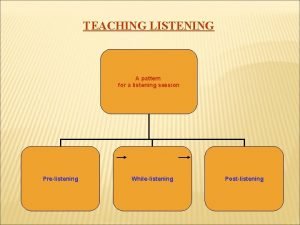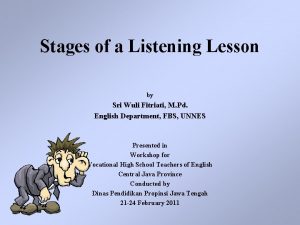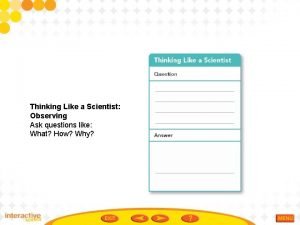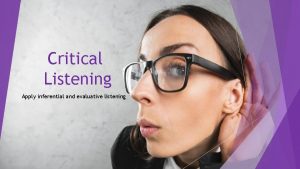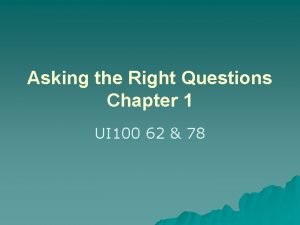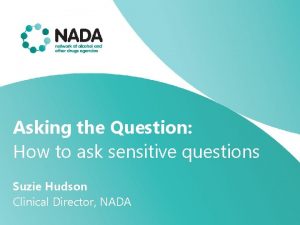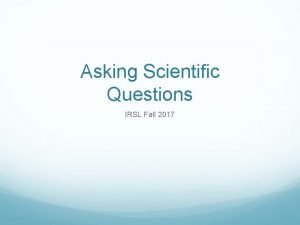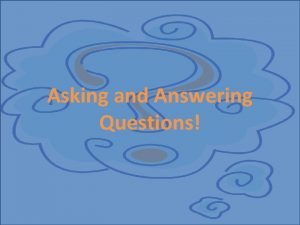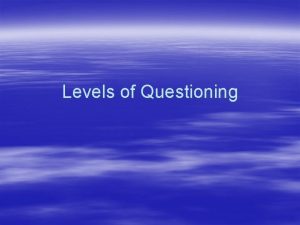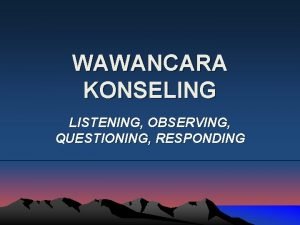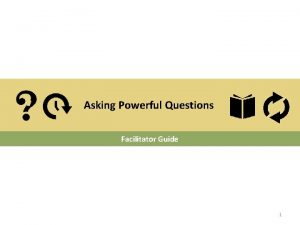COMMUNICATION Questioning and Listening Questions Asking questions is












- Slides: 12

COMMUNICATION Questioning and Listening

Questions Asking questions is an integral part of communicating, but we are not always aware of the effect our questions have. Sometimes questions promote communication but at other times it can be hindered by them.

TYPES OF QUESTIONS • There are several types of questions. • Can you name one type of question? ?

TYPES OF QUESTIONS Closed questions • These are questions which can be answered fairly simply, usually with the words “yes” or “no” or with a brief answer e. g. • “Did you enjoy supper? ” • “Yes” or “No”

TYPES OF QUESTIONS Open-ended questions – • Open-ended questions give the other person an opportunity to answer in different ways. Such questions begin with the word ‘how’ or ‘why’ e. g. • “How are you feeling? ”

TYPES OF QUESTIONS Useful questions • Useful questions give others an opportunity to speak. These short questions can almost be a supplement to a statement and can show others that they should speak next. • Such questions are called supplemental questions, e. g. “It was a good game, wasn’t it? ” is your question or perhaps you voice your opinion first, saying to someone else “You know what I think, don’t you? ”

TYPES OF QUESTIONS Can you make a list of reasons for using questions.

TYPES OF QUESTIONS Questions are used for a number of different reasons • to report back • to keep a person talking • to make things clearer • to show that the receiver is interested in the conversation

TYPES OF QUESTIONS Questions can also be • Futile e. g. when a person asks too many questions • Sensitive – when a person asks questions about things which they never should ask • Confidential – when questions should not be asked, knowing that the information is confidential

LISTENING EFFECTIVELY On the whole, we are poor listeners. Research shows that we listen for periods of 30 seconds before losing concentration. • We tend to hear what is of interest to us and ignore other things. We ‘Switch off’ if we’re bored or if we don’t like the person who is taking to us, and then follow our own train of thought. • • Effective listening or active listening means that we must concentrate carefully.

LISTENING EFFECTIVELY In order to make sure that we are listening effectively, we need to: • Maintain eye contact and control facial expressions • Adopt positive physical gestures • Listen, and allow the other person to finish, before reflecting and summarising what he/she has said • Be patient • Respect silence

LISTENING EFFECTIVELY What is being said below? ?
 Pre while post listening activities
Pre while post listening activities Stages of a listening lesson
Stages of a listening lesson Listening and questioning skills
Listening and questioning skills Complete the conversation. use the present continuous
Complete the conversation. use the present continuous Observing and asking questions
Observing and asking questions Active vs passive listener
Active vs passive listener What is inferential listening
What is inferential listening What if questions to ask
What if questions to ask Positive question tags
Positive question tags Sponge and panning for gold approach
Sponge and panning for gold approach How to ask sensitive questions
How to ask sensitive questions Asking scientific questions activity
Asking scientific questions activity Answering questions in spanish
Answering questions in spanish
